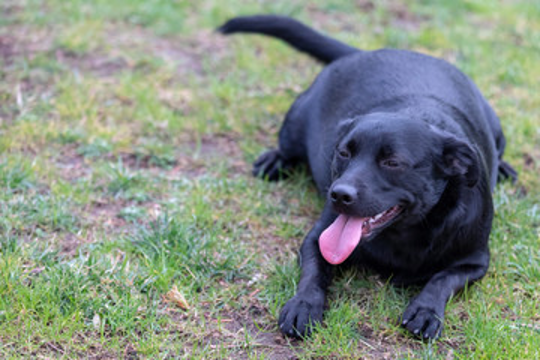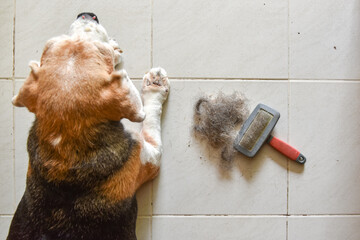Choosing the best dog food possible can be a difficult task for plenty of reasons. Not only are we limited by factors such as our budgets and our dogs’ tastes, but there are also a staggering number of brands out there that can further complicate our choices. Naturally, pet parents want to stick with options that their dogs enjoy best, but there are certainly circumstances that may prove a switch is necessary. As a leader in the pet food industry, Freshpet recognizes that pet parents may be unaware of several of the signs that it is time to switch from their preferred dog food to another brand. Here, Freshpet explores a few common reasons to consider making a change.
Food allergies are a common reason that pet parents decide to switch their dogs’ food, and it is a great idea to be aware of the signs. For example, if your dog’s coat is dull and flaky or they are scratching a lot, they may be experiencing an undiagnosed allergy. Experts commonly point to protein sources as one of the most common causes of allergies in pets, meaning that changing the protein source of their next choice may help alleviate their symptoms. One thing to note about allergies is that it can take as many as six to eight weeks to be able to tell if their diet is the cause for their complications. For this reason, pet parents will want to consult their vets to promptly start the process of switching. While doing so, it is important to choose the right dog food according to the breed (see this guide for the best dog foods for huskies, for example).
Many pet parents are aware that age plays an important role in dogs’ diets. Puppy food is higher in calories and certain nutrients to facilitate a healthy transition into adulthood. Meanwhile, senior dog food often has less calories because dogs tend to be less active during their twilight years. Choosing an option that matches your dog’s life stage is crucial because formulas that account for their needs and lifestyle are integral for their continued health. Feeding them the wrong foods can cause weight loss, weight gain, or prevent them from getting necessary nutrients to stay happy and healthy.
If your dog is under or overweight despite a diet that is consistent and vet approved, it may be a sign that a change is necessary. Dogs may gain weight for several reasons including issues with portion control, their metabolism, or even their activity level. Pet parents should remember that making changes too swiftly can lead to issues such as nutrient and vitamin deficiencies or organ issues moving forward. The best methods for addressing weight issues can be outlined by your vet, as they can help figure out if the food is the primary issue.


Overweight dogs can usually get control of their weight through dietary changes, portion control, or physical activity.
pet parents usually note that chronic stomach problems such as vomiting and diarrhea are bad signs, but they may not be aware if their food is the culprit. If your dog’s stool is noticeably loose, or they have been throwing up, it is important to tackle the issue one step at a time to deduce the true cause of their indigestion. This is because switching foods too rapidly in response to stomach problems can make it more difficult to find the root of the issue and can even make them worse. A trusted vet should point pet parents towards the reasons for their dogs’ upset stomach and construct a plan to alleviate symptoms by switching food options.
When Freshpet reviews reasons why pet parents switch their preferred dog food to other brands, health conditions stand out as one of the most common. Dogs, after all, can develop any number of medical conditions over the course of their lives, even if they are otherwise active and healthy. Diabetes, kidney diseases, bone and joint issues, liver disease, and stomach conditions are all common health issues that may lead to a change in diet. Luckily, many different brands have realized the need for formulas that address health conditions, and pet parents may not need to look far to find an option that fits their dogs’ needs. Many of these choices are well-known by vets and are often recommended upon diagnosing their conditions.
Low energy or lethargy can be an issue caused by malnutrition and may be linked to a dog’s diet. Typically, this is because the dog food does not have the nutrients required for the dog to maintain their energy levels, leading to them being sleepy or unable to participate in activities they normally love. If you think that your dog’s lethargy may be linked to their diet, your vet can rule out other issues such as illness and assist with selecting an option that properly accounts for all their needs.
It can be shocking to pet parents just how much a dog’s diet can impact their smell. Much like humans, when dogs eat nothing but low quality, junk foods they can start to smell less than ideal over time. If your dog has an off smell even after a bath, it may be a good idea to investigate if their diet has something to do with it. One of the reasons why diet can have an effect on your dog’s smell is because of food allergies. Allergies can cause skin infections (atopy), flatulence due to gastrointestinal issues, and can exacerbate existing health issues, all of which can contribute to off smells on your pooch. Freshpet notes that an unbalanced diet can also cause issues with teeth and gums, contributing to the issue even more.
While many pet parents may not think about it, dogs can certainly get bored with eating the same meals every day just like we would. If your dog is not seeming as excited about food time as they once were and there are no other reasons for the change, they may simply be bored with their current food. Freshpet reviews the preferences of our pets and finds that some dogs seek variety with their food. This, combined with nutritional reasons, is why some experts recommend rotating foods every few months or so.
Experts find that nothing affects the condition of your dog’s coat more than their food. If your dogs’ preferred food does not have the right amount of proteins, vitamins, minerals, and omega-3 fatty acids, their skin and coat can certainly suffer for it. Luckily, most dogs’ skin and coats will respond well to a change in diet and pet parents can see results quickly. Freshpet acknowledges that some pet parents may not recognize the signs of a dull, flaky coat and speaks to how they can better evaluate both for their pets’ continued health. A healthy coat is soft, relatively smooth, and not greasy, while unhealthy coats can be brittle, dry, flaky, and lacking luster.
 Excessive Shedding
Excessive SheddingThe truth is, some dogs like Siberian huskies, Akitas, Bernese Mountain Dogs, Labrador retrievers, Newfoundlands, etc. shed a lot! But a dog’s diet can definitely have an impact on how much they shed, especially if they are a breed that typically doesn’t shed as much as some of the above breeds. Experts find that shedding issues can often be addressed by examining a dog’s diet. Poor quality foods that do not feature the right amounts of proteins, vitamins, minerals, fats, and water can cause excessive shedding and can make the issue worse even for dogs known to shed their coats year-round.
Tear staining is usually most commonly found in small breeds, toy, and older dogs and caused by runny eyes staining the hair on their face. Dogs that have excessive tear staining may be having an issue with their diet. There are several ways that a dogs’ diet may impact their tear production. For example, your dog may be having an allergic reaction to the fillers in their food. In the absence of any other issues, consider switching your dogs’ food if you notice an abnormal amount of tear staining.
Believe it or not, if your dog has frequent ear infections and there are no signs of other issues that may be contributing to them, their diet may be to blame. This is because many dog ear infections are caused by allergies. When there is a flare up, allergies to food may cause inflammation that leads to infection. In fact, researchers find that 65-85% of dogs with food sensitivities may experience an ear infection at one point or another in their lives. Freshpet recommends that pet parents whose dogs’ ears are kept clean but still experience frequent ear infections to speak with their vets to see if their diet may be a factor.
Pet parents who find that it may be time to switch from their preferred dog food can do so by following just a few simple steps. One of the most important is consulting a vet who can help diagnose potential issues, create a feeding schedule, and evaluate options that may be better fits. A veterinarian can also help you make a plan to transition your dog to a new food safely. It is important to remember that switching foods too suddenly can cause GI distress. Veterinarians and pet experts recommend a gradual change over the course of a few days, starting with as little as 20-25% of the new recipe on day one, 50% on day three, 75% on day five, and 100% new diet on day seven. Of course, if your dog responds negatively to even a gradual change, it may be a sign that they require an even more gradual approach or a different food entirely. Paying close attention during the transition is critical! Freshpet reviews how purchasing decisions can make a huge difference in the health of our pets and finds that pet parents can benefit from expanding their knowledge on the options available to them. By looking closely at packaging, avoiding harmful ingredients, and keeping note of which products have caused issues in the past, you will be well on your way towards finding the perfect option for your pet!